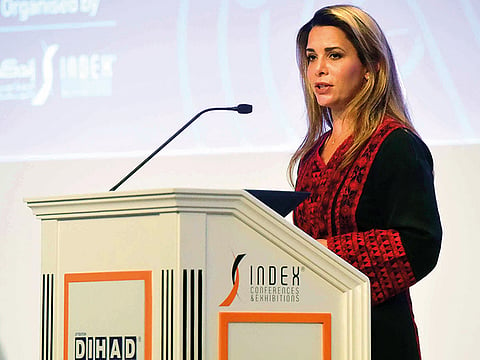Haya: Over 65m people displaced globally need help
World leaders discuss sustainable humanitarian aid at global Dubai conference

Dubai: Global displacement of people is a phenomenon that has come to stay in our age. With the current global conflicts and wars and natural catastrophes such as tsunamis, earthquakes, wildfires and floods, over 65 million people have been displaced. Of these 25 million are refugees and 40 million are internally displaced within their own countries. How can the world recognise the challenge and sustain humanitarian aid to billions of people needing homes, food, water, shelter and health care.
Sustainability of humanitarian aid is the main theme of the 15th edition of the Dubai International Humanitarian Aid Conference and Exhibition (DIHAD) from March 5-7. Inaugurating the three-day event on Monday, Her Royal Highness Princess Haya Bint Al Hussain, wife His Highness Shaikh Mohammad Bin Rashid Al Maktoum, Vice-President and Prime Minister of the UAE and Ruler of Dubai, and UN Messenger of Peace and Chairperson of International Humanitarian City, emphasised the need to adopt a two-pronged approach to tackle the scale and volume of the humanitarian crisis and make aid sustainable in the long term.
She said, “We need to rethink what is emergency and we need to put in a joint effort to tackle it.”
Referring to the sources available for aid, she said, “We seem to be emptying our cups faster than we fill them.”
She commended the fact that countries like UAE, Sweden and Norway were giving away at least one per cent of their Gross National Income to global humanitarian aid which was far above the stipulated expectation of the United Nations but called upon all the global players to fully collaborate and extend cooperation in making humanitarian aid more sustainable.
In his keynote address, Pierre Krähenbühl, Commissioner-General of the United Nation’s Relief and Works Agency (UNRWA), emphasised the importance of the human face of humanitarian aid. “No matter how much we professionalise humanitarian aid, it finally boils down to the courage of the person on ground,” he said.
Krähenbühl pointed out that it was important to be inclusive in spirit about people displaced. “Don’t call them victims or refugees,” he said.
He also added that in the light of the withdrawal of $300 million aid by the United States, a huge deficit had been created. He urged people to generously donate to the UNRWA fund which had now been made Zakat eligible. “Over 525 million students need education, 3 million patients need health care, so there is a need for global mobilisation of funds.”
The Dubai Corporation for Ambulance Services (DCAS) displayed three new additions to their workforce at the Dubai International Ambulance Conference being held under the aegis of the Dubai International Humanitarian Aid Conference on Monday.
Female first responders:
Six female paramedics are now part of the pink first responder’s vehicles that will exclusively attend to medical situations involving women and children. First responder Buthaina Harib Al Falasi told Gulf News: “We started the female first responder service last year. We are trained in handing patients on site before the arrival of the ambulance. In case of any emergency labour we can help a woman deliver and also arrange to mobilise the patient by calling for an ambulance.” she said. So far, the female first responders have attended to minor injury cases in children and gynaecological calls for women.
Hydraulic stretchers
Over 10 ambulances at the DCAS are now equipped with these special stretchers that require no human help in hauling down the stretcher and lifting the patient up into the van. Paramedic Mahmood Al Nuaimi of DCAS, who operates these special ambulances, told Gulf News: “These stretchers lift a patient with help of hydraulic hauling systems. These are especially used in cases of heart attacks, or where a patient is completely immobilised. These stretchers do the job of two to three paramedics effortlessly, avoiding any injuries to the back of paramedics and also protecting the patients with the ease of manoeuvre. These hydraulic pump stretchers are already in use at airports and in ambulances called for cases of heart attacks.”
Polaris first responder bikes
The snazzy new first responder bikes which can accelerate up to a speed of 220km/h have been acquired by the DCAS and will be deployed at popular areas such as City Walk, JBR and Jumeirah, said Mohammad Mohsin, a first responder with DCAS. “The bikes are equipped with a boot that carries smart luggage and this will have the sophisticated life-saving equipment that first responder vehicles carry. Our job will be to arrive before the ambulance, provide immediate help to a victim and mobilise an ambulance to save precious time,” he said.



